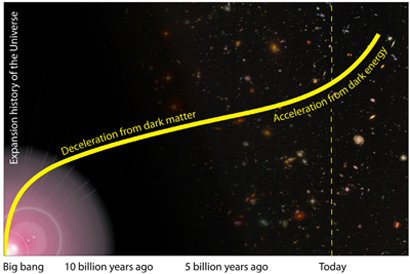"Are dark matter and dark energy related?" is a common question I get. Here's the deal: the *only* way dark matter and dark energy are related is that they both have "dark" in their names, which is a placeholder for things we can't see and don't understand.
Dark matter is stuff, that, like regular matter, is most likely made of subatomic particles, but ones that have yet to be discovered. There's about 5 times more dark matter than there is regular matter in the Universe, making it the most dominant form of matter.
Dark matter provided the seeds for galaxies to form in the early Universe, and now holds galaxies and galaxy groups and clusters together, preventing them from flying apart. You may find an analogy I made for dark matter useful:
https://twitter.com/Astropartigirl/status/1051950116376965120?s=19
In the analogy you'll find that dark matter only interacts with gravity, to our knowledge; it may also experience interactions with "dark" forces we don't understand yet. But its lack of interaction with light/normal matter is what has made it elude detection for many years.
While dark matter is the most dominant form of *matter* in the Universe, dark energy is the most dominant component of the Universe. Of the Universe's contents, 70% is dark energy, 25% is dark matter, and a tiny 5% is regular matter, the stuff that we're made of and understand.
Dark energy is stuff that causes the expansion of the Universe to accelerate, stretching it apart faster and faster as time progresses! The reason this is true is also the reason dark energy is one of the strangest things in the Universe.
As the Universe expands, matter and radiation dilutes, ie their density decreases since their amounts are the same, but the volume/space they're in increases due to expansion. Radiation dilutes faster than matter bc it also redshifts w/ expansion, causing it to lose more energy.
While matter and radiation dilute with the expansion of the Universe, dark energy does not. In other words, the density of dark energy remains *constant* as the Universe expands!! It is the same today as it was in the early Universe, and will be the same when the Universe dies.
So in the early Universe, the density of matter, and radiation, were larger than dark energy. At that time, the Universe grew slowly, and the gravitational pull of matter wads stronger than the "stretch" of dark energy. But nevertheless, the Universe grew. And dark energy waited.
As the Universe expanded, matter and radiation became less important as their densities decreased, with radiation becoming unimportant first bc of its extra energy loss to redshift. In fact it has diluted so much today that its energy contribution to the Universe is negligible.
So we're left with matter and dark energy. Eventually their densities became equal because the density of matter was diluting, while dark energy remained *constant*. Today we are just past that point, so there's not enough matter to combat the expansion due to dark energy.
So you see, eventually dark energy won over matter. Earlier matter (and therefore gravity) was able to prevent the expansion of the Universe from accelerating bc it had higher density than dark energy did. Not anymore, which is why the expansion is accelerating.
You can see that in this figure below. Earlier in the Universe's history, matter actually caused the expansion to decelerate. Then the curve turns upward, because it can no longer fight dark energy.
Source of the figure: sci.esa.int/euclid/46673-e…
Source of the figure: sci.esa.int/euclid/46673-e…

In the very distance future, matter will not matter any longer, and all that will matter is dark energy because everything else will be so diluted that you could call the Universe one that's nothing but flat and only containing dark energy. We call this a de Sitter Universe.
Basically dark energy is the beast that did nothing but wait until it became more important than the other stuff in the Universe, and now it's winning and causing the expansion of the Universe to accelerate.
And that concludes today's episode of cosmology with the Astropartigirl. Happy Tuesday!
I should add that a constant density for dark energy best fits current models, but dark energy *might* be even weirder: it might *increase* with time! If that's true then the future is bleak, as everything, even atoms, will be torn to shreds in the end. This is a big rip.
But if it *is* constant, then instead, the Universe will probably die in a heat death, where there's no more energy to create things, and entropy stops. Then everything just freezes, and blinks out of existence by freezing to death. Maybe protons decay, but that's about it.
I don't know if I'd rather be around for the heat death or the big rip, but I think I'd prefer to just not be around for either. Luckily, most likely nobody will. 🙂
• • •
Missing some Tweet in this thread? You can try to
force a refresh







